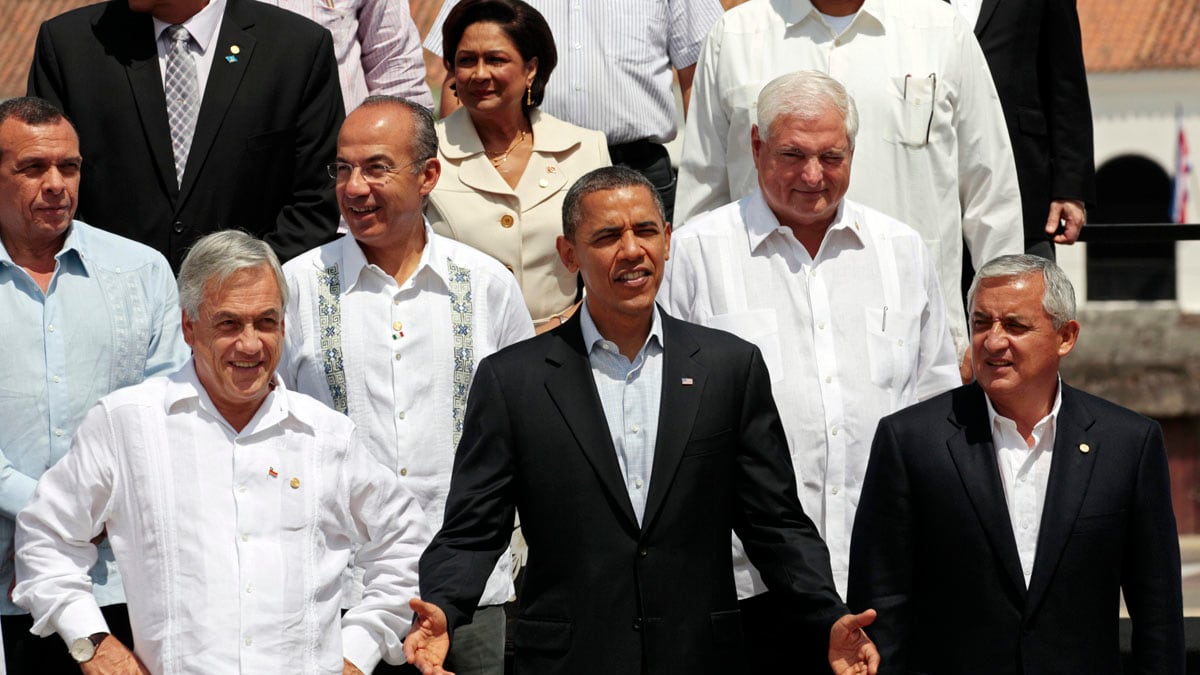Forget the tarts and the tales of gringos gone wild. The foreign-affairs scandal dogging Washington these days is not over Secret Service agents cavorting with call girls in the tropics—in Colombia, two weeks ago, and before that, according to the latest from the Beltway moles, in El Salvador.
The real embarrassment to flag and country is less about what America’s finest do when the lights are low, but how the leader of the free world carries on with historical allies across the hemisphere. Three plus years ago, Barack Obama was hailed practically as a redeemer throughout the Americas, a region resentful of gringo unilateralism and of being bumped from Washington’s terrorism-obsessed foreign agenda. At the Summit of the Americas in Trinidad and Tobago, in 2009, Obama acknowledged the disconnect and won praise by promising a “restart” of U.S. relations with Latin America. Today, most of Obama’s extraordinary political capital has been spent, and while he remains personally popular in the region, Washington’s policy in the Americas appears to be suffering from acute attention deficit.
Consider the Sixth Summit of the Americas, held at Cartagena, Colombia, two weeks ago. It was Obama’s fourth trip to Latin America and he landed in the Caribbean with an impressive 1,000 aides and handlers in tow. And yet from day one of the gathering of 32 heads of state, the U.S. and the rest of the Americas appeared to be living in different hemispheres. Instead of effectively leading a conversation on how to mend the strained relations south of the equator, Washington found itself on the defensive, battered by Latin American gripes and resentments, both real and imagined, and sucked into no-win arguments on issues (legalizing drugs, democracy, free trade) and anachronisms (Cuba) that not even Latin leaders agree upon.
The result was a weekend of sound and fury, and no concluding statement. “It’s extraordinary for a high-level meeting like this to end without some final declaration, no matter how anodyne,” says Rubens Barbosa, a former Brazilian ambassador to Washington. No wonder the summit was eclipsed by the B-movie imbroglio over Secret Service agents moonlighting as sex tourists.
Not that the Colombian parley was ever going to be easy diplomacy. In fact, in many ways the themes raised were sand traps waiting for a false step. One was drugs. Yes, Colombia managed to turn the tide in the last decade against the Revolutionary Armed Forces of Colombia (FARC), the drug-financed Marxist insurgency that once controlled half the national territory.

But Colombia was yesterday’s triumph. Just as a water balloon bulges when squeezed, pressure on Colombia’s bandits pushed drugs and trafficking to other compass points. Cocaine and marijuana production are up in Peru and Bolivia, while international drug cartels have migrated to Mexico and Central America, a step away from U.S. consumers. Along the way, they have left a trail of violence and disorder that has claimed 48,000 lives in Mexico alone since 2006, and that experts fear is threatening the region’s young democracies.
A number of Latin American leaders, including for the first time sitting heads of state (of Guatemala, Costa Rica, and Honduras), are now openly debating decriminalizing drugs. This is not yet a Latin American consensus; the Brazilian government, for one, is not pushing legalization. But you don’t need a continental roll call to know that the vaunted war on drugs, launched in the 1970s by Richard Nixon, is faltering.
And yet well before the summit, Vice President Joe Biden toured the region to say legalizing drugs was a nonstarter in the U.S., where Obama’s reelection bid is under assault by conservatives who blame him for being soft on crime, illegal aliens, and bullies overseas.
Another flashpoint: the renewed diplomatic battle over the cluster of islands in the South Atlantic that Argentines call Las Malvinas and Britain The Falklands. Argentine President Cristina Kirchner has been stumping the globe to renew her country’s claims to the windblown islands that brought the two nations to war in 1982. Having signed on all of Latin America, she brought her case against British “imperialism” to Cartagena in hopes of winning Washington’s imprimatur.
Instead, Obama sidestepped the sovereignty row altogether and then—in a gaffe widely seen as a display of yanqui indifference—called for a diplomatic solution for “the Maldives,” confusing the South Atlantic protectorate with the Indian Ocean atoll. Kirchner abruptly left Cartagena before the summit ended.
She didn’t miss much. The other dead-end issue in Cartagena was the absence of Cuba, locked out of hemispheric get-togethers for decades on the argument that an unapologetic dictatorship has no place at the head table of a region committed by charter since 2001 to promoting and defending democracy.
Still, the snub to Havana nearly sabotaged the entire encounter, prompting Ecuadorian President Rafael Correa to boycott the summit and opening the floor to an anti-U.S. barrage. President Barack Obama, aptly, vented frustration over being “caught in a time warp,” as nation after nation took the microphone to denounce the half-century-old U.S. embargo against Havana and the military base and prison in Guantanamo, among other “imperialist” outrages.
And yet, to hear it from diplomats and analysts, Washington itself may be stuck in its own Cold War groove. By bending to the powerful Cuban-American lobby and blackballing Havana, the argument goes, the U.S. virtually assured a failing communist gerontocracy a political afterlife in a region where its presence is no longer relevant nor even missed, except perhaps at overwrought summits.
Former Brazilian foreign minister Luiz Felipe Lampreia recalls a moment some years back when regional leaders, weary of the blather, weighed scaling back the yearly Ibero-American gathering to a biannual summit. “Don’t do this!” Fidel Castro protested. “This is the only chance I get to see all of you together. I’m never invited to meetings anymore.”
Not so long ago, a meeting of the most powerful figures in the hemisphere meant something more. President Bill Clinton envisioned forging a common market from Patagonia to British Columbia, and in 1994 launched the Summit of the Americas to give the free-trade zone a political agenda.
The grand Free Trade Area of the Americas never took off and was officially buried at a rancorous summit in 2005, the victim of its own ambitions, policy drift in Washington, and suspicions in Latin America of Tío Sam’s imperial designs. “It wasn’t so much that trade was seen as bad as that Latin Americans wanted to avoid an agreement that they felt could be dominated by the U.S. while Washington lost its lead,” says Eric Farnsworth of the Council of the Americas, a Washington-based policy think tank.
With free trade off the rails, now many in Latin America wonder if the regional compact also has run its course. “The Americas Summit has lost its purpose other than as a chance for small nations that feel slighted to vent their frustrations over the U.S.” says Lampreia.
“We have succumbed to Summitism, meeting for the sake of meeting,” says Brazilian diplomat and foreign-policy scholar Paulo Roberto de Almeida. “Never have the real differences between nations been so great nor have heads of states come together so often to make speeches so absolutely hypocritical.”
Ironically, Latin America has never been as important as it is today. With stable governments and a growing middle class, the region is a magnet for entrepreneurs, with GDPs growing at 3 to 4 percent while the U.S. is struggling and Europe skates on the edge of recession. If Washington hasn’t noticed, Beijing has. Thanks to generous financing and waves of aggressive commercial diplomacy, booming China has replaced the U.S. as the alpha trade partner in much of South America, while trade within Latin America also is surging.
Fortunately, U.S. companies have awoken to the opportunity. Not least in Brazil, the $2.5 trillion economy that comprises half of Latin America’s GDP. “In the private sector, the word is out,” says Barbosa, who recently met with 100 medical-equipment suppliers in Tennessee eager to sell to Brazil.
Barbosa says he believes that the pomp and posturing of hemispheric parleys will give way to results-oriented bilateral initiatives, noting that in the span of a week, Secretary of State Hillary Clinton and Defense Secretary Leon Panetta called on the emerging regional powerhouse.
Meanwhile, Brazilian tourists, alongside the Chinese, led the yearly pilgrimage to Disney World, spending more in 2011 than any other nationality. The Latin invasion was not lost on Obama, who recently announced a tourist-led jobs initiative. It’s not exactly a new hemispheric agenda, but it’s better than throwing stones over octogenarian communists in Cuba or issuing disclaimers about agents who can’t keep their holsters on.






